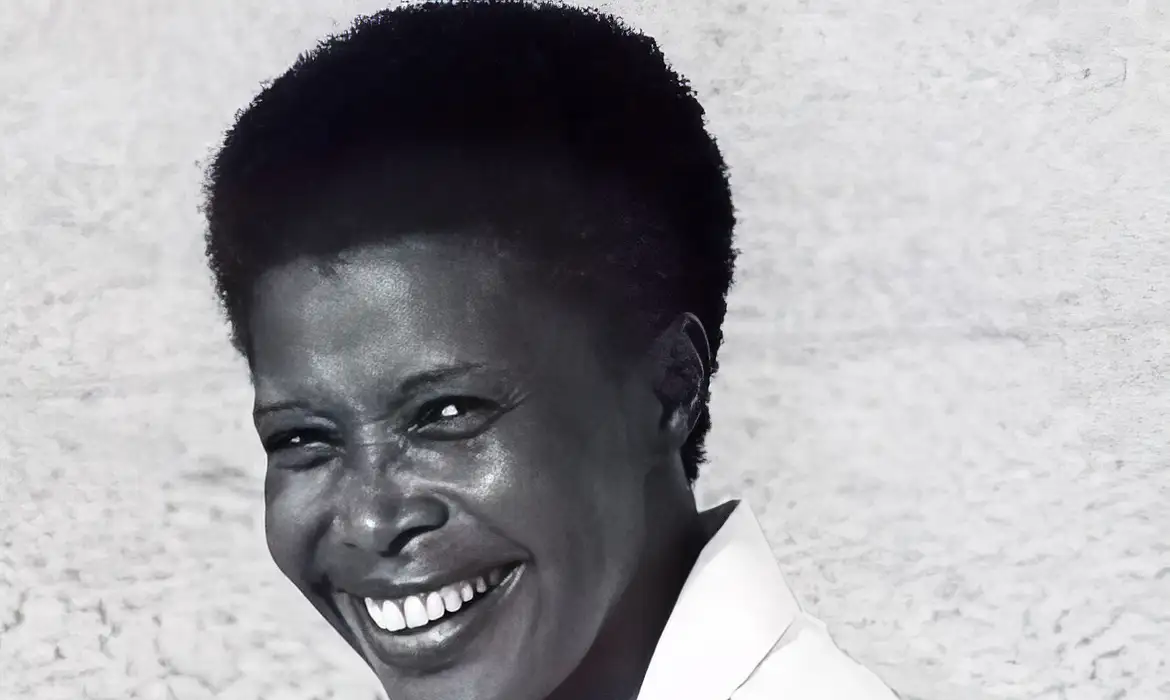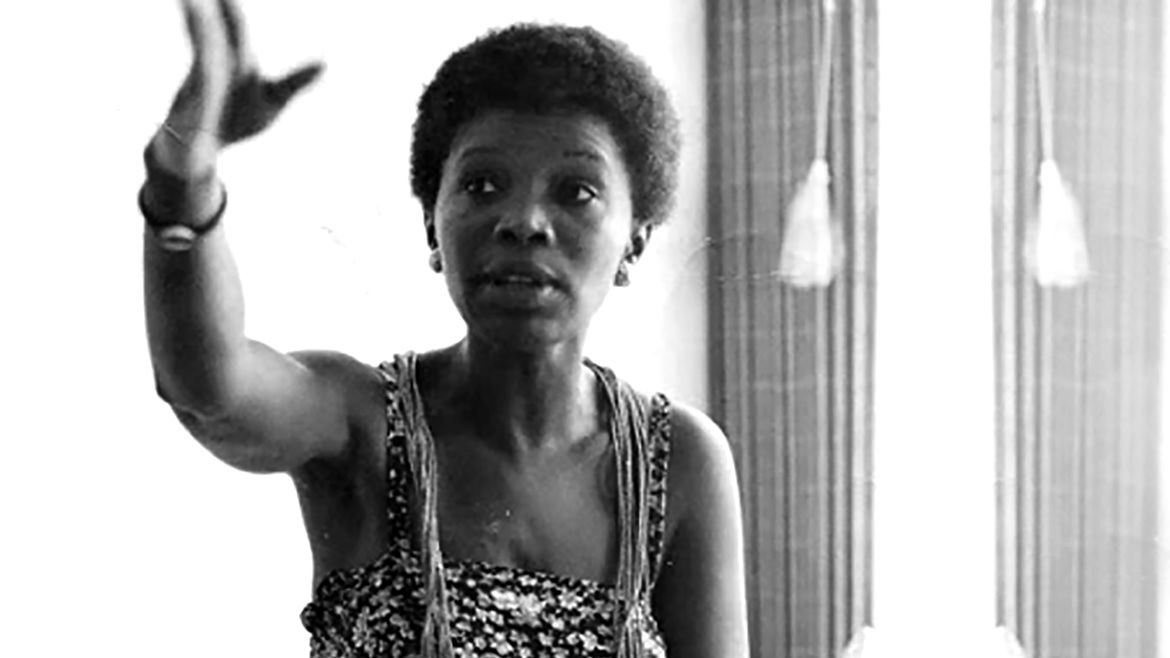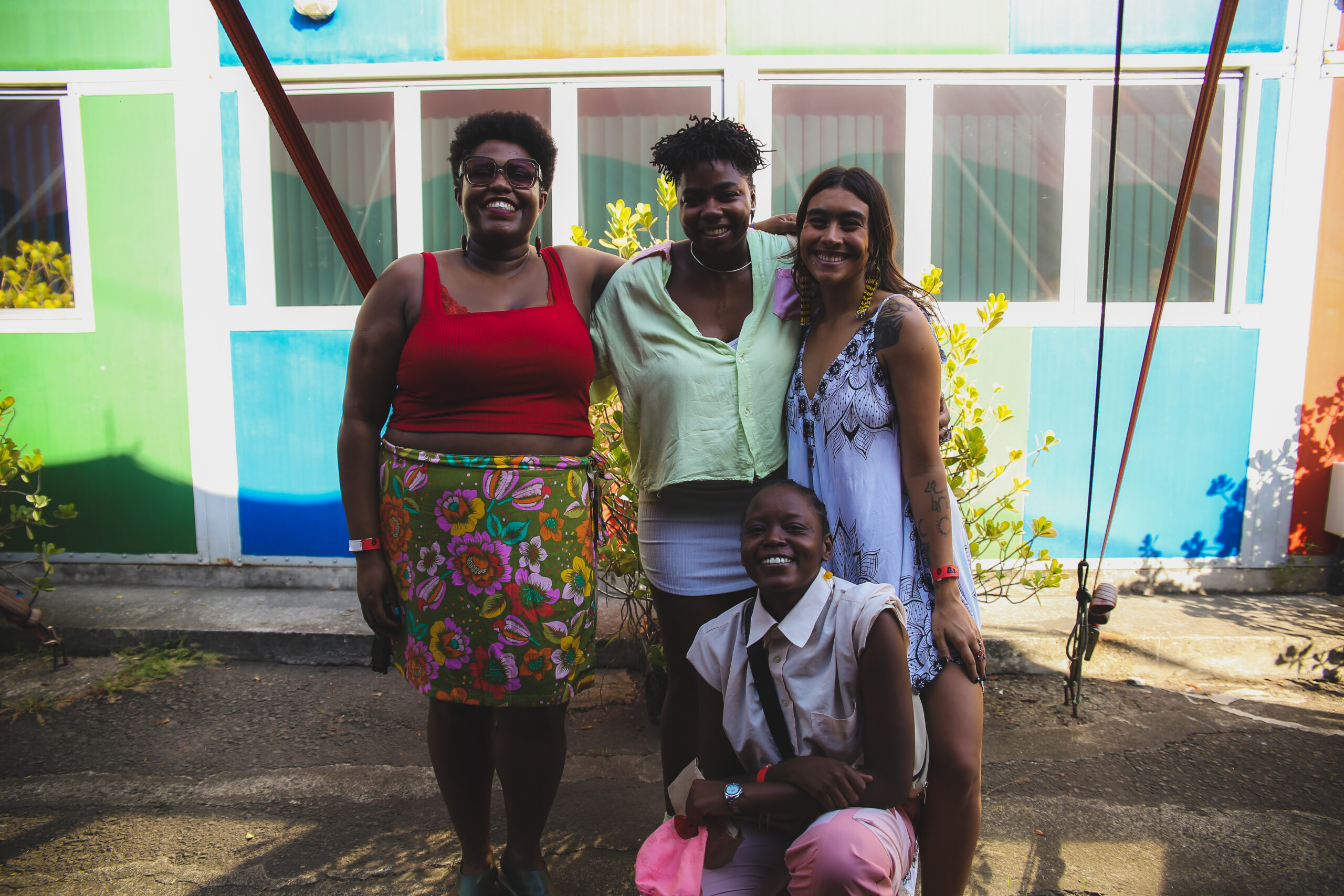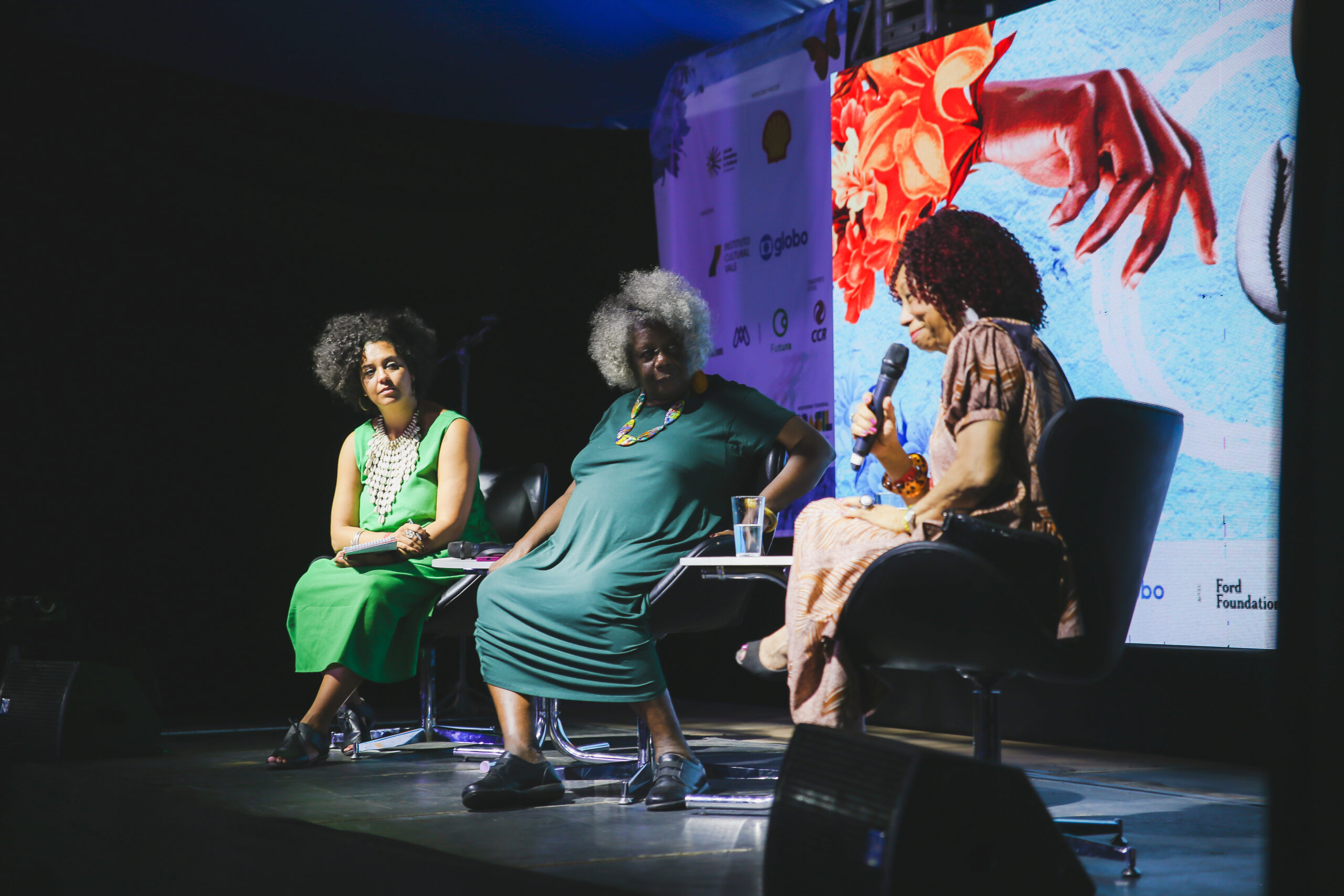
Clique aqui para Português
Rio de Janeiro’s Urban Peripheries Literary Festival (FLUP) kicked off its 14th edition on Saturday, May 11 with an event held at Circo Crescer e Viver, in the area now known as Cidade Nova. Formerly recognized as Praça XI, the region stands as one of the cradles of Rio de Janeiro’s samba culture, home and terreiro [sacred space of Afro-Brazilian worship] of critical women like Tia Ciata, in the heart of downtown. The festival’s 2024 program promises to be rich and diverse, offering courses and workshops from June to August. This edition’s honoree is the intellectual from Sergipe: historian, pioneer of the Brazilian Black movement, poet, and filmmaker Beatriz Nascimento.
Visibility to Black and Peripheral Narratives: Beatriz Nascimento and the Quilombos
The gira [a sacred space in Afro-Brazilian religions—a circle of mediums, drums, and practitioners which invokes spiritual entities], the circle and circularity are ancestral movements that express the essence of African and Afro-Brazilian civilizational values. These deeply meaningful expressions were chanted during the 14th edition of the event, and present insurgent voices to the reality of the Brazilian publishing market. Brazilian writers are 93.9% white, occupying the privileged positions and professions in the production of discourse: the fields of journalism and academia.
FLUP aims to challenge this hegemony within the Brazilian literary scene, promoting access to books and literary writings, debates, and the visibility of Black, favela, and peripheral intellectuals who have been historically silenced.
At FLUP, writer Conceição Evaristo highlighted the festival’s great potential in democratizing access to literature and spreading the legacy of Black intellectuals, such as Beatriz Nascimento. Evaristo also emphasized the thinker’s importance for historiographical studies from a Black perspective.
“Beatriz Nascimento was a historian from beginning to end.” — Conceição Evaristo
The historian revolutionized studies on contemporary quilombos, investigating them as units of Black protest and resistance. This thesis, previously presented by the Black intellectual Clóvis Steiger de Assis Moura in his book Quilombos: Resistance to Slavery, was updated by Nascimento, who drew parallels with the quintessential spaces of contemporary Black Brazilian culture: favelas, carnival communities, and centers of Afro-Brazilian religious worship.

In 1977, early in her career, during the Black Fortnight at the University of São Paulo (USP), Nascimento laid out a few foundations of her hypothesis of the quilombo being ancestral strategy of resistance:
“Thus, from this moment on, the use of the term ‘quilombo’ will take on a basically ideological and essentially doctrinal connotation in the sense of gathering, in the sense of community, in the sense of struggle—recognizing men, recognizing people who should truly fight for better living conditions. They are part of this society and should fight for their rightful place.”
The founding director of FLUP, Julio Ludemir, emphasized the importance of the writer’s thought for historiography from a Black perspective:
“The word ‘quilombo’ did not exist as a symbol of strategy and survival intelligence. We want her work to be increasingly known, read, published; to reach even further.”
In 1989, the author also produced the film Ôrí, which, from an Amefrican perspective, can mean ‘head,’ both physical and internal. This head guides, references, directs, gathers intellect, memory, and thought, bringing together present, past, and future, and can take on the political meaning of Black consciousness. Ôrí is not merely the concrete head above the neck but the spiritual head, representing the deeper ‘self.’ Ôrí was directed by Raquel Berger, with research, screenplay, and narration by Beatriz Nascimento.
In this work, Nascimento places the quilombo at the center of Black existence. She recounts the history of Black movements between 1977 and 1988 to outline a social, political, and cultural panorama of the country, seeking an identity and highlighting the importance of quilombos in shaping a national identity.
Following an Afro-Brazilian-centered perspective, adopted by the thinker, FLUP organized panels and activities on literature and racial issues. Family members and friends of the intellectual attended the event, moved by the tribute.
“She planted this seed in me when I was just a child. For Beatriz Nascimento, the quilombo is a form of political and social organizing with a strong ideological influence.” — Evorah Nascimento, Beatriz Nascimento’s niece
Panel: ‘Let the Gira Turn’ Discusses the Issue of Religious Racism and Literature in Terreiros

This program brought together Yalorixá (Candomblé Priestess) Márcia Marçal, writer and matriarch of Ilê Asé D’Oluaiyè Ny Oyá, Mother Flávia da Silva Pinto, sociologist, writer, and matriarch of Casa do Perdão, and Natara Ney, a filmmaker from Pernambuco state who also serves as a curator of FLUP. The panel’s goal was to address women’s empowerment, religious racism, and education and literature in terreiros—the sacred spaces of Afro-Brazilian worship.
“I will pay tribute to the two Beatrizes that FLUP chose to honor. Last year, Beatriz Moreira Costa (Mother Beata de Iemanjá), now an ancestor, and this year, Beatriz Nascimento. Both were committed to fighting religious intolerance and promoting racial literacy. Beatriz Nascimento, along with Lélia Gonzalez, turned to Africa to understand history, because part of religious racism stems from an untold memory.” — Flávia Pinto
In the same vein, Márcia Marçal continued the discussion on religious racism in Brazil.
“Religious intolerance happens because it is a Black religion. Everything that comes from Black people is spoken ill of and looked down upon. Others always think it’s for doing evil. I wish people would come to our terreiros to see how [warmly] we welcome them.” — Márcia Marçal
Ver essa foto no Instagram
Besides dedicating themselves to Afro-Brazilian religions, both Marçal and Pinto are also writers. In 2021, Marçal, matriarch of Ilê Asé D’Oluaiyè Ny Oyá, published I’d do it all again. In 2021, Flávia Pinto released Hail the Matriarchy: Manual of the Buffalo Woman, and in 2022, Black Umbanda: African and Indigenous Roots. Marçal commented on the importance of children from terreiros having access to books.
“When I created the literary space in the terreiro, things just kind of unfolded from there. With the life I had, I left school very early, but I always wanted to learn. And the orixás started giving me children who were educated, so I learned. When I saw that I had a piece of land where I could build a library, I created this space because I didn’t want the children from where I came from [Carobinha, Campo Grande, in Rio’s West Zone] to go through what I had gone through.” — Márcia Marçal
The Beatriz Nascimento Poetry Slam took place during the breaks between each panel, with the participation of Carol Dall Farra, Josi de Paula, Winona Evelyn, and MC Martina. Before reciting their original poetry and those of Beatriz Nascimento, they’d chant:
“Where the world begins. Begins Beatriz. And I’m inside the Beatriz Nascimento Poetry Slam.”

Panel: “Night Doesn’t Sleep in the Eyes of Women”
This moment brought together author Conceição Evaristo and philosopher Helena Theodoro, both of whom had a close friendship with Beatriz Nascimento. This panel was named after a story that took place between Nascimento and Evaristo.
“She did a job at the José Bonifácio Cultural Center for the city government. On payday, I collected Beatriz’s honorarium and arranged to meet her at the Amarelinho [bar]. Eventually, it closed [for the day]. We headed towards Botafogo, since she [Beatriz] lived in Urca, and we spent her entire payment along the way. By the time we reached Botafogo, we didn’t have any money left to get back. So, we sat on the sidewalk in front of Canecão [entertainment venue], and Beatriz suggested, ‘Let’s wait for the day to break,’ and we spent the night there. That’s where it came from: ‘Night Doesn’t Sleep in the Eyes of Women.’” — Conceição Evaristo

Moderated by writer Bianca Santana, the panel brought up emotional memories of Beatriz Nascimento and discussed her thoughts on the quilombo.
“What the Black community offers is highly evident in Nascimento’s work. Prior to her studies, the quilombo was perceived as a folkloric space, characterized as a place for runaway slaves with four to ten people living in them. Nascimento shattered that perception! She portrays the quilombo as a distinct State policy, different from the Portuguese and the Spanish approaches.” — Helena Theodoro
Ver essa foto no Instagram
The Aquilombamento Continues
The event also marked the opening of registrations, with a deadline of May 25, for the writing workshop “Yabás, Queen Mothers,” which will result in the 32nd book published by FLUP. The workshop will consist of seven meetings, held on seven consecutive Saturdays, with dates yet to be scheduled, in terreiros dedicated to worshipping each of the feminine orixás, or Yabás: Iemanjá, Oxum, Obá, Iansã, Nanã, and Ewá, including the feminine entity Pomba Gira. The 50 selected participants will write stories based on the itans, mythical narratives involving these important protagonists of Afro-Brazilian cosmology.
“Our culture’s resistance is found in the terreiros: [in] mothers who nourish, tell stories, and take care of their children. [It’s our] ‘orí’-entation. This formative process contains the beauty of encounters, storytelling, and oral traditions. I believe that each visit will provide us with unique teachings, not only for our writing but for our lives.” — Natara Ney
FLUP will initiate another training program in June, the Quilombo Slam, echoing the work of Beatriz Nascimento and dedicated to the memory of the quilombola intellectual Nêgo Bispo, who passed away in 2023. Ten quilombos from ten different Brazilian states will participate, hosting slammers—performance poets who engage in spoken word poetry slams (battles). These slammers will lead workshops in poetry and performance in the quilombos. Each quilombo will host a local slam, and the winners from each state will travel to Rio de Janeiro for the grand final in November.
In addition, in August, the eighth edition of the Black and Indigenous Narratives Laboratory for Audiovisual — Lanani will be launched. The partnership with Globo TV has trained over 200 screenwriters over the past seven years. There will be three months of training with two weekly meetings, one for classes on narrative formats and audiovisual script structures and another for mentoring sessions to discuss participants’ individual projects. The goal is to produce a pitch for audiovisual content—films, series, or soap operas.
Thus, as proposed by Beatriz Nascimento, aquilombar is necessary to preserve Black and indigenous memory and ancestry. In this sense, through workshops and events, FLUP becomes a powerful channel for the circulation of this knowledge and wisdom in Brazilian society. According to the organization, FLUP’s inaugural event had a rotating average of 1,200 attendees.
Ver essa foto no Instagram
About the author: Carol Marinho was born and raised in Complexo do Alemão, holds a master’s degree in Ethnic-Racial Relations, and is an educator and journalist.
